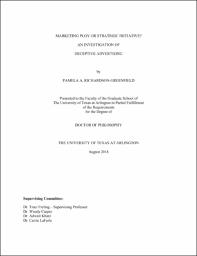
ATTENTION: The works hosted here are being migrated to a new repository that will consolidate resources, improve discoverability, and better show UTA's research impact on the global community. We will update authors as the migration progresses. Please see MavMatrix for more information.
Show simple item record
| dc.contributor.advisor | Freling, Traci | |
| dc.creator | Richardson-Greenfield, Pamela A. | |
| dc.date.accessioned | 2020-08-04T18:26:05Z | |
| dc.date.available | 2020-08-04T18:26:05Z | |
| dc.date.created | 2018-08 | |
| dc.date.issued | 2018-07-31 | |
| dc.date.submitted | August 2018 | |
| dc.identifier.uri | http://hdl.handle.net/10106/29330 | |
| dc.description.abstract | The number of commercial messages that consumers are exposed to on a daily bases is unknown, although some experts estimate it is at least 500 ads per day. Most pundits in the field of advertising agree that it is ubiquitous. For advertisers and marketers, it is critical for them to create advertising messages that break through the clutter and capture the attention of today’s consumers—who are distracted and overwhelmed. One tactic that practitioners employ to capture consumers’ attention in this challenging environment is deceptive advertising, which exaggerates—or even lies—about the attributes of a promoted product. This dissertation explores this topic using methodological triangulation, examining deceptive advertising from the perspective of those who create it (e.g., advertising practitioners), assessing the overall impact of deceptive advertising on consumer evaluations, and empirically investigating the most effective crisis response strategies that should be issued following allegations of deceptive advertising.
In the first essay, in-depth, semi-structured, qualitative interviews are conducted with advertising practitioners to better understand deceptive advertising and its impact on the advertising profession. Deceptive advertising does not seem to be a concern for advertising practitioners, as most rely upon their corporate and moral values to navigate the ethical landscape of the advertising world. These professional also indicate that, because consumers have access to more product information than even before, misleading consumers with false advertising claims is less impactful. In the second essay, a meta-analysis is conducted to synthesize over 40 years of research on the relationship between deceptive advertising and consumer evaluations (i.e., purchase intentions and attitude toward the ad). Findings suggest that deceptive advertising positively affects consumer evaluations, but this relationship is moderated by the content of the advertising message (i.e., whether the ad features a real brand and contains pictures and/or words and which type of product is being promoted). The third essay builds on the first two essays, empirically testing the appropriate crisis response strategies advertisers should enact following accusations of deceptive advertising. The moderating impact of skepticism toward advertising is also explored. Findings indicate that consumers are able to detect differences in deceptive ads, depending on how deceptive the message is. And, importantly, consumers appear to be more forgiving when product attributes are embellished than when advertisers blatantly lie. | |
| dc.format.mimetype | application/pdf | |
| dc.language.iso | en_US | |
| dc.subject | Deceptive advertising | |
| dc.subject | Deception | |
| dc.subject | Advertising practitioners | |
| dc.subject | Qualitative research | |
| dc.subject | Ethics in advertising | |
| dc.subject | Meta-analysis | |
| dc.subject | Crisis response strategy | |
| dc.subject | Situational Crisis Communication Theory | |
| dc.subject | Skepticism | |
| dc.subject | Skepticism toward advertising | |
| dc.subject | Crisis | |
| dc.subject | Response strategy | |
| dc.title | Marketing Ploy or Strategic Initiative? An Investigation of Deceptive Advertising | |
| dc.type | Thesis | |
| dc.degree.department | Business Administration | |
| dc.degree.name | Doctor of Philosophy in Business Administration | |
| dc.date.updated | 2020-08-04T18:26:06Z | |
| thesis.degree.department | Business Administration | |
| thesis.degree.grantor | The University of Texas at Arlington | |
| thesis.degree.level | Doctoral | |
| thesis.degree.name | Doctor of Philosophy in Business Administration | |
| dc.type.material | text | |
| dc.creator.orcid | 0000-0002-9698-8441 | |
Files in this item
- Name:
- RICHARDSON-DISSERTATION-2018.pdf
- Size:
- 2.234Mb
- Format:
- PDF
This item appears in the following Collection(s)
Show simple item record


